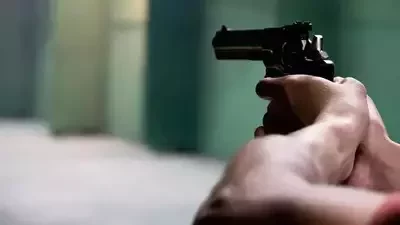The US Senate easily approved a bipartisan gun violence bill that seemed unthinkable just a month ago, paving the way for final congressional approval of what will be lawmakers’ most far-reaching response in decades to the country’s string of heinous mass shootings.

Following last month’s rampages in New York and Texas, Democrats and some Republicans decided that congressional inaction was untenable after years of GOP procedural delays that derailed Democratic efforts to curb firearms.
It took weeks of close-door negotiations, but a bipartisan group of senators came up with a compromise that represents incremental but significant progress toward ending the bloodshed that has come to regularly shock — but no longer surprise — the nation.
In an unexpected move, 15 Republicans joined Democrats in supporting the bill, which was passed by a vote of 65 to 33.
The bill will now be sent to the House for a vote before being signed into law by President Joe Biden.
Measures approved
The $13 billion bill would toughen background checks for the youngest gun buyers, keep firearms out of the hands of more domestic violence offenders, and assist states in enacting red flag laws that make it easier for authorities to seize weapons from dangerous people. It would also fund programmed for school safety, mental health, and violence prevention The election-year package fell far short of the more robust gun restrictions Democrats have sought for years, such as bans on assault-style weapons and high-capacity ammunition magazines used in the killings in Buffalo, New York, and Uvalde, Texas.
Republicans who voted against the bill
Potential 2024 presidential candidates such as Tom Cotton of Arkansas, Ted Cruz of Texas, Josh Hawley of Missouri, and Tim Scott of South Carolina voted “no.”
Some of the party’s most conservative members voted “no,” including Kentucky Senator Rand Paul and Utah Senator Mike Lee.
While the US Senate bill was a significant step forward, the prospects for continued congressional action on gun control are bleak.
Less than one-third of the US Senate’s 50 Republican senators supported the bill, and strong Republican opposition is expected in the House.
In an email, the No. 2 Republican leader, Rep. Steve Scalise of Louisiana, urged a “no” vote, calling the bill “an effort to gradually chip away at law-abiding citizens’ 2nd Amendment rights.”
Both chambers, which are now narrowly controlled by Democrats, could very well be run by the GOP after the midterm elections in November.
Why do Americans own guns?
Americans buy guns for personal security, hunting, and recreation.
According to a Gallup poll conducted in 2021, 88 percent of gun owners purchased firearms for self-defense, up from 67 percent in 2005.
According to a Gallup poll conducted in 2019, a smaller percentage of people kept guns for hunting (40 percent), nonspecific recreation or sport (11 percent), as an antique or family heirloom (6 percent), or was related to their line of work (5 percent).
The percentage of gun owners who kept firearms for hunting fell from nearly 60% in 2000 to 40% in 2019.
The proportion of people who kept firearms for “sport” fell even further
Biden’s retort
President Joe Biden said in a statement that when he visited Uvalde, residents told him that Washington needed to act.
“This legislation will make our schools and communities safer for our children.”
“I urge Congress to complete the job and get this bill to my desk,” Biden said.
The Senate action came one month after a gunman in Uvalde killed 19 students and two teachers.
Just days earlier, a white man was accused of being motivated by racism when he murdered ten Black grocery shoppers Buffalo.
Both shooters were 18 years old, a profile shared by many mass shooters, and the close timing of the two massacres and victims with whom many could identify sparked a demand for action from voters, lawmakers from both parties said.
Murphy represented Newtown, Connecticut, when an assailant killed 20 students and six staff members at Sandy Hook Elementary School in 2012, whereas Cornyn has been involved in previous gun talks following mass shootings in his state and is close to McConnell.
What exactly happened on 25 June 1975 that made PM Gandhi declare the national emergency?













